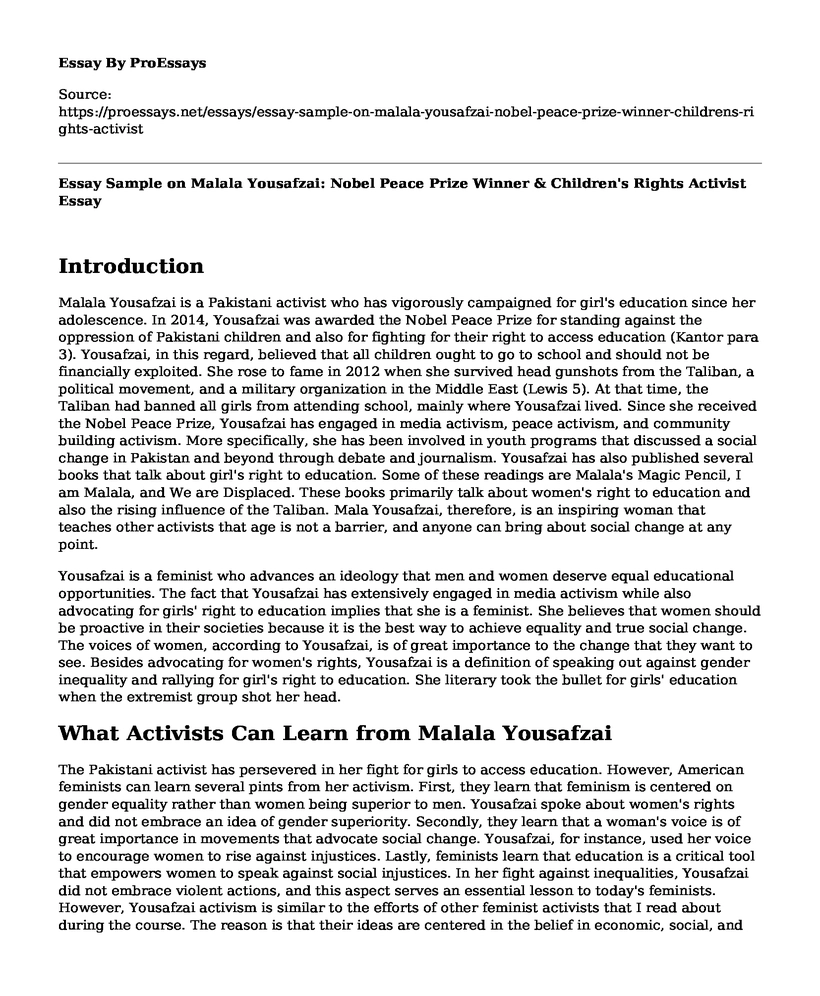Introduction
Malala Yousafzai is a Pakistani activist who has vigorously campaigned for girl's education since her adolescence. In 2014, Yousafzai was awarded the Nobel Peace Prize for standing against the oppression of Pakistani children and also for fighting for their right to access education (Kantor para 3). Yousafzai, in this regard, believed that all children ought to go to school and should not be financially exploited. She rose to fame in 2012 when she survived head gunshots from the Taliban, a political movement, and a military organization in the Middle East (Lewis 5). At that time, the Taliban had banned all girls from attending school, mainly where Yousafzai lived. Since she received the Nobel Peace Prize, Yousafzai has engaged in media activism, peace activism, and community building activism. More specifically, she has been involved in youth programs that discussed a social change in Pakistan and beyond through debate and journalism. Yousafzai has also published several books that talk about girl's right to education. Some of these readings are Malala's Magic Pencil, I am Malala, and We are Displaced. These books primarily talk about women's right to education and also the rising influence of the Taliban. Mala Yousafzai, therefore, is an inspiring woman that teaches other activists that age is not a barrier, and anyone can bring about social change at any point.
Yousafzai is a feminist who advances an ideology that men and women deserve equal educational opportunities. The fact that Yousafzai has extensively engaged in media activism while also advocating for girls' right to education implies that she is a feminist. She believes that women should be proactive in their societies because it is the best way to achieve equality and true social change. The voices of women, according to Yousafzai, is of great importance to the change that they want to see. Besides advocating for women's rights, Yousafzai is a definition of speaking out against gender inequality and rallying for girl's right to education. She literary took the bullet for girls' education when the extremist group shot her head.
What Activists Can Learn from Malala Yousafzai
The Pakistani activist has persevered in her fight for girls to access education. However, American feminists can learn several pints from her activism. First, they learn that feminism is centered on gender equality rather than women being superior to men. Yousafzai spoke about women's rights and did not embrace an idea of gender superiority. Secondly, they learn that a woman's voice is of great importance in movements that advocate social change. Yousafzai, for instance, used her voice to encourage women to rise against injustices. Lastly, feminists learn that education is a critical tool that empowers women to speak against social injustices. In her fight against inequalities, Yousafzai did not embrace violent actions, and this aspect serves an essential lesson to today's feminists. However, Yousafzai activism is similar to the efforts of other feminist activists that I read about during the course. The reason is that their ideas are centered in the belief in economic, social, and political equality of both sexes.
Conclusion
Malala Yousafzai is a notable feminist activist that have played leading roles in advocating for women's liberty and girl's right to attend school. She has published several books to illustrate how Taliban activities in Pakistan deny young girls their right to education. Feminist activists learn from the story of Yousafzai that feminism is all about gender equality. Therefore, they should discourage the notion that feminism is about women being superior to men.
Works Cited
Kantor, Jodi. "Malala Yousafzai, Youngest Nobel Peace Prize Winner, Adds to Her Achievements and Expectations." The New York Times - Breaking News, World News & Multimedia, 15 Oct. 2014, www.nytimes.com/2014/10/11/world/asia/malala-yousafzai-youngest-nobel-peace-prize-winner-adds-to-her-achievements-and-expectations.html. Accessed 14 Dec. 2019.
Lewis, Kristin. "Malala, the powerful." Springfield Public Schools, Scholastic Corporation, Sept. 2013, www.sps186.org/downloads/basic/586885/Malala%20the%20Powerful.pdf. Accessed 14 Dec. 2019.
Cite this page
Essay Sample on Malala Yousafzai: Nobel Peace Prize Winner & Children's Rights Activist. (2023, Mar 16). Retrieved from https://proessays.net/essays/essay-sample-on-malala-yousafzai-nobel-peace-prize-winner-childrens-rights-activist
If you are the original author of this essay and no longer wish to have it published on the ProEssays website, please click below to request its removal:
- The Communications Infrastructure Essay
- Article Analysis Essay on Intercultural Communication
- The Role of Women in the Hebrew Bible Essay Example
- Societies in the Neolithic Period Essay Example
- Ethical Issues Related To Nuclear Energy - Essay Sample
- Effective Communication: A Necessity in Life - Essay Sample
- Self-Esteem: Brain's Vital Role in Interpersonal Interactions - Free Paper







